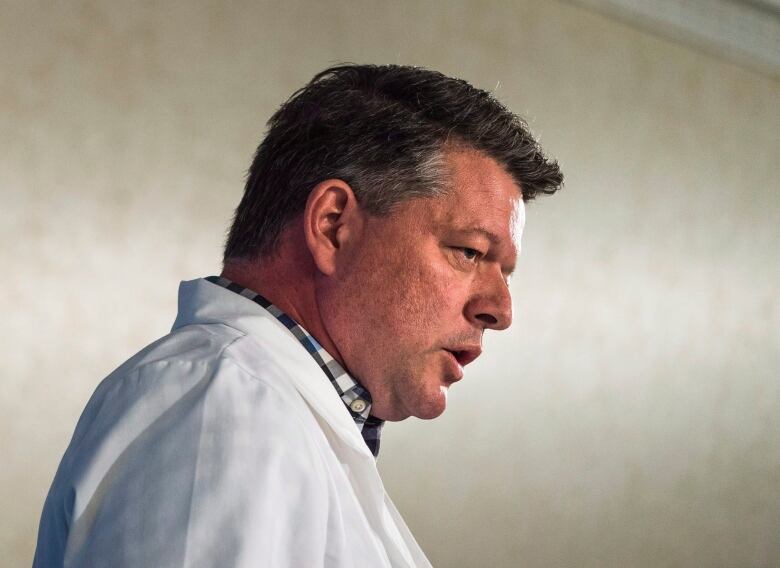Gord Downie's courage called a 'beacon for all patients with glioblastoma in Canada'
How openness can foster awareness and understanding for patient and public alike

Tragically Hip frontmanGord Downie's resilience and openness about his terminal glioblastoma and his plans to tour could help to reduce stigma and improve awareness, some cancerexperts say.
Tuesday's news revealed that the singer has anaggressive form of cancer that originated in his brain. AnMRI scan last week showed the tumour has responded well to surgery, radiation and chemotherapy, doctors said.
"I was quickly impressed by Gord's resilience and courage,"Downie's neuro-oncologist,Dr. James Perry of Sunnybrook Health Sciences Centre, told a news conference.
Perry said it's daunting for many of his patients to reveal the diagnosis to their family, children and co-workers.
"The news today, while sad, also creates for us in brain tumour researchan unprecedented opportunity to create awareness and to create an opportunity for fundraising for research that's desperately needed to improve the odds for all people with this disease," Perry said.

"Gord's courage in coming forward with his diagnosis will be a beacon for all patients with glioblastoma in Canada. They will see a survivor continuing with his craft despite its many challenges."
Openness and understanding
Dr. Gary Rodin is a clinician-investigator and head of supportive care at Princess Margaret Cancer Centre in Toronto. Heleads research on the psychological effects of advanced and terminal disease on patients and their families.
Rodin, who is not involved in Downie's care, said thatoften people with a serious cancer want to disclose it, because doing so makes them feel more in control.
"When people are open about it, I think it allows people to understand the problem, it allows people to appreciate the bravery of people like that," Rodin said.
People with a serious diagnosis, especially when they have symptoms, are very aware of it. Spouses and family members may be afraid to talk about it sometimes, which can make the patient feel more isolated and alone, Rodin said.
Althoughsinger-songwriter David Bowie chose to stay private about his diagnosis, Rodin noted that he did share it with family members and those close to him those who most need to know to avoid a "conspiracy of silence around the patient" that can add to difficulties.
Planning life in the face of death
People with serious cancers are encouraged to develop a "double awareness" engaging in life while planning for the eventuality of death, Rodin said.
Some doctors are skilled communicators at presenting the difficult news, said blogger AnneMarie Ciccarella of New York, whodescribes herself as 10 years post treatment for ER positive breast cancer. Ciccarella has alsowitnessed the toll of malignancies among her family members and loved ones.
Historically, training for physicians focused more on the physical aspects of cancer and less on the skill of communicating bad news, Rodin said.
"To the person who is being told cancer, everything stops and you are just gasping for air trying to digest that word and then a million questions start flying through your head," Ciccarella said.
Earlier this week, researchers published a small study in the Journal of Clinical Oncology based on interviews with 178 patients with advanced cancer in the U.S. whom oncologists expected to die within six months. The findingssuggested 10 per cent reported recent discussions on prognosis.Those who did "came to have a better understanding of the terminal nature of their illnesses," the study's authors said.
Glioblastoma "spiders out," which makes it so heart-wrenchinglydeadly anddifficult to treat, Ciccarellasaid, because of the nature of the tumour cells. "They're going to find their ways to make problems regardless of what you do."
Downie's voice
Ciccarella applauded Downie for coming forward after the shock of diagnosis, brain surgery that would scare most, and the exhaustion that often comes with daily radiation and chemotherapy.
"He now chose to take an opportunity and use his voice to bring awareness to something few knew about."
Ciccarella pointed to the greater awareness that came after U.S. Vice-President Joe Biden spoke earlier this year of losing his son Beau to glioblastoma. Biden's National Cancer Moonshot Summit aims to double the pace of research towardcuring cancer.
In contrast, research suggests stigma itself can have a silencing effect that reduces cancer awareness.












_(720p).jpg)


 OFFICIAL HD MUSIC VIDEO.jpg)
.jpg)



























































































